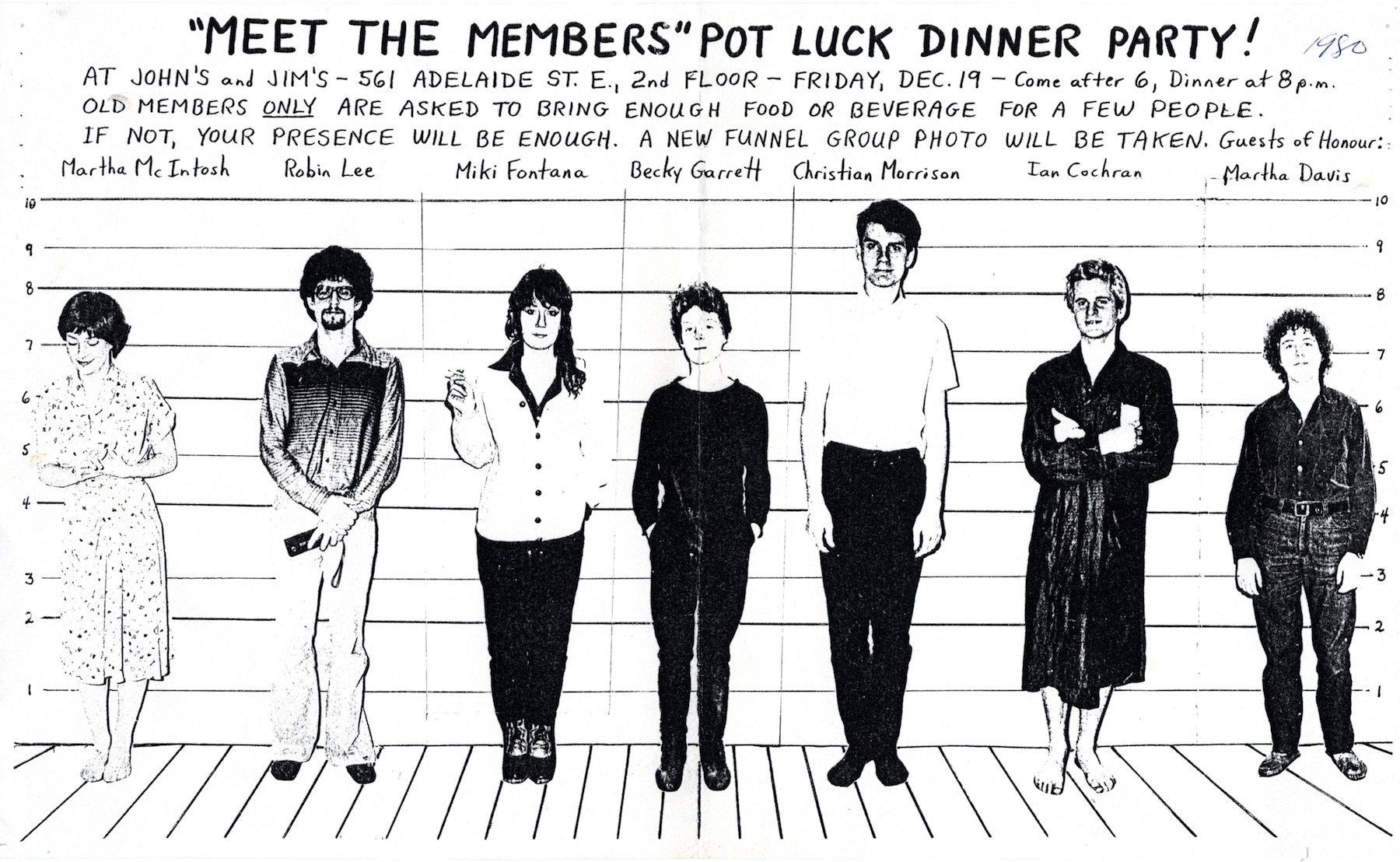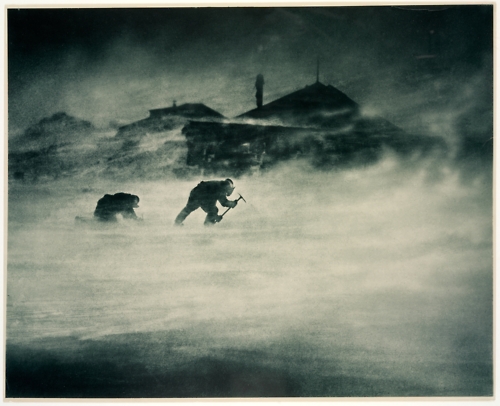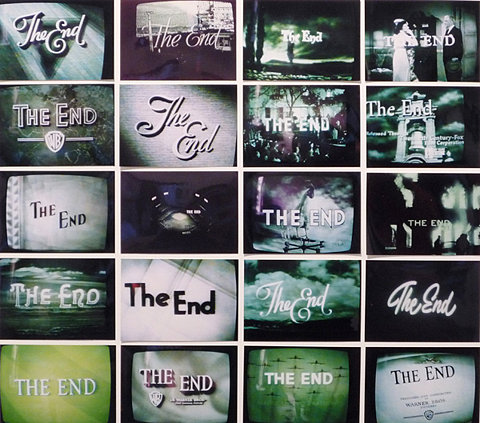Funnel Notes by Ian Cochrane
March 25, 2013
When someone mentions the Funnel, what comes to my mind are memories of so many extraordinary screenings, and visitors from everywhere. One sunny winter day, I walked into the office and found Martin Rumsby sneezing on the sofa, with a terrible head cold, a cardboard box full of mail, and his large, battered backpack sitting on the floor beside him. I was one of the projectionists at the Funnel, and spent many hours in the darkness with the projectors whirring and clattering along, a part of my mind monitoring the sound levels and machines, the rest of me dreaming along with the film. One evening I projected Robert Frank’s Pull My Daisy (1959). He was there in the audience, and when I was introduced to him later in the lobby, he complimented me on the quality of projection. I was floored.
I spent many hours in the absolute dark of the optical printer room, counting frames, exposing, testing exposures and durations, shifting time. This can all be done now quite quickly in Final Cut Pro, but then it took days! I also helped run the small black and white reversal processor there, processing 16mm and Super 8 film for myself and other filmmakers. We were able to push and pull process on this machine, and do manual negative processing on our home bucket system. I found it quite satisfying to be able to help others in this way.
I edited several short films on the rewinds in the lobby/office, working at night as it was quieter then, in overnight sessions with the radio playing along in the background, punctuated by the occasional streetcar rumbling by. I remember taking a nap for an hour when I was up against a particularly difficult editing problem, then waking up with Brave New Waves in my ears and the decision made.
I have always considered film as a kind of shared dreaming, existing in a space somewhat analogous to the Japanese ideal of a ‘floating world’. In Japan this refers to the night world of theatre, geisha, and night time adventure under the influence of the moon. The alternate, dreaming world made manifest. The Funnel made possible a particular kind of ‘floating world’ of creativity which was not there before, and possibly not since. It was not any kind of heaven, of course, there were lots of disagreements, and the meetings could be exhausting. But there were also the after screening beers at the Dominion Tavern with our guests and many other good times. I was honoured then and remain so, now, to have been involved.
April 28, 2013
Everything here is my recollection; no guarantees that it will match with anyone else’s!
During the censorship fights the Funnel was caught in the middle: as a funded art space it was required to adhere to federal and provincial mandates and laws, while by inclination it was not interested in doing so.
Melinda Rooke’s hiring: I don’t remember if she was advertised for, or whether she was found by someone on or near the board, like Michelle McLean, who knew lots of people in the arts communities in Toronto. Her name was brought to the board at a meeting, for pursuance.
Increasing pressure from the Canada Council demanded we raise our profile (ie: get a glitzier address more in keeping with a well-funded(!) government-funded(!), internationally known organization. At one point they threatened to cut our operations funding (used to pay the rent, and salaries of the director and technician, the only paid employees of the organization).
Melinda Rooke was hired because we needed someone who had more contacts with the funding bodies, a professional administrator who indeed was not an “insider,” to negotiate with the Canada Council and the province, and to help the Funnel make the transition that the CC especially were pushing very strenuously. We were told that if we didn’t move we might have our funding removed. It was a way of forcing the Funnel to re-examine its position politically, in my opinion. So hiring Melinda was seen as a strategic way to move forward. It became apparent to us, certainly to me, that we show the Canada Council that we were willing to open up our organization by moving outside of our little circle.
Melinda was in charge of this transition process, and of negotiating it with the CC and provincial bodies. We knew we would need increased funding from the arts councils and/or increased revenue from shows to do this. It was an ambitious goal, but we were not given any alternatives. If we had stayed at the King Street location we could have kissed our Canada Council funding goodbye — which would mean no more technician, no more programmer.
I think Ross McLaren had left to teach in New York at this point, and it resulted in a board which was much weaker; he had always been a central force when discussions spun away from the central issues. The board made decisions by consensus, which often meant marathon meetings (five hours!) in which things often got emotional. Ross was usually able to bring the discussion back to the main point while letting everyone air their points of view. Some folks resented him for this role, but I felt he wielded his power (as ‘founder’) in a quite restrained and generally gentle way. He was genuinely interested in discussion, and it was, after all, our primary method in coming to decisions.
The membership split over the issue of moving – the extra cost of building a new theatre plus a lease in a new location that was guaranteed to be more expensive, with no guaranteed recovering of any of these potential expenses through increased funding (though vague promises were floated). The Funnel lost fully half its members over the move.
At this point Melinda was negotiating directly with the Ministry of Culture for moving and renovation funds. She reported that they were positive, but the ministry had not signed any cheques. Talks were ongoing.
I helped a bit in the move to Lonely St. It was a place to store equipment rent free; we were desperate to save money, as we had to find the money to renovate the new space somehow. The Council was entirely unwilling to put forward any funding for the move.
At this point, feeling fatigued, I took some time off from the Funnel, gave up my board position, and depended on David Bennell, my roommate at the time, to keep me posted on any important developments. He was in charge of the new theatre, but there were not the bodies ready and willing to work that there had been in the previous theatre incarnations. He worked on it himself, and I helped him now and again, but was working full time as usual. I didn’t attend a board meeting until about nine months later. It was at this meeting that Melinda melted down and had to leave.
We found out that we had committed to a lease we couldn’t afford. The Canada Council was still antagonistic, even though we had done what they asked. The Ministry of Culture was proving to be unhelpful, though they still claimed there might be something coming. The theatre was half-finished. Melinda was freaked out.
I returned and took over, with David’s help, the finishing of the theatre in the new space so we could try to get some bodies in to see some shows. Some dodgy scheme with UI was brought forward so that Gary could continue to provide technical services to what remained of our membership. It took so long because there were only a few people working on it, and we all had jobs as well…
I don’t remember the dark haired man you mention. I do remember that the financial system in place was desperately inadequate, there was no money for anything. I certainly did not think everything was fine – I thought it was a train wreck. But I have the highest regard for Gary McLaren, who continued through all this to push the day-to-day operations forward. This could not have been easy.
I believe the members didn’t want to pay the fees because the theatre was not usable yet — it was also an expression of their frustration over the move in the first place. But those members had never come up with any rational way for the Funnel to stay on King Street. My feeling about the move was that it might work, but that it was punishingly difficult for the membership and the leadership of the Funnel, and at this point I was having difficulties believing that the Canada Council, who directly instigated it, cared whether we succeeded or not. They certainly did not lift a finger to help us.
The idea of the benefit/free screening series came up and was developed. I helped project a few shows – I remember a friend of yours, Gary Popovich, and a few others, but after completing the theatre, I was coming to fewer shows, out of a sense of emotional self-preservation. It was so depressing to be around all of that runaway emotion, most of it negative, over a period of a couple of years.
The free screening series seemed to generate its own friction in the community, and added to the fallout over the move in the first place, and the apparently somewhat contentious stance of the Funnel… I felt let down by the community, that there was little appreciation for what the Funnel had done, or could yet morph into. I felt that the Canada Council had targeted the Funnel as an object lesson to the rest of the good orgs in town. It is important to remember that the Funnel’s finances were never irregular or problematic prior to the Council’s gentle guidance.
The Soho Street space eventually shut down because the Funnel got caught in a financial bind – our membership was decimated, so that portion of income (never that large anyway) was gone. The Ministry of Culture was supposed to come through with money to replace the operations funding we had spent on the renovations and move. They declined, a year too late, to keep their word.
The Canada Council then decided, if I recall, to pull the plug on their future funding, partially because they felt we had misused operations funding… and the Ontario Arts Council, who had originally been very supportive (though not increasing our funding) were now saying that perhaps they could no longer support the Funnel’s activities either. There was no realistic question that the Soho space could support itself on a purely commercial basis.
Melinda’s failure, I feel, was due to a large extent because she was unable to extract concrete assistance from the Canada Council (some might call it accountability, in light of their behaviour) and from the Ministry – it does seem to me to be dishonest on the part of these entities. I believe Melinda tried her best, and nearly had a nervous breakdown, while those folks in their offices yanked her (and our) strings. How amusing for them.
I think it was at this point that the big meeting you mentioned occurred. I remember going, but I don’t remember much about it. I think I, not to mention everyone else involved, was exhausted. I believe it was a last ditch attempt to see if any groups in the community had any ideas for, or interest in helping the space go forward, in any way it could. The problem of the membership and access to gear was that this was tied closely to the Funnel’s identity as an artist-run center rather than a purely filmmaking center. I think there had been neither the time nor energy required to re-conceptualize the Funnel without the restrictions that had been in effect (no commercial use, etc.). It seems kind of old-fashioned now, but this was one of the major sticking points preventing change there.
When it came to the acting board’s attention that a group of filmmakers was demanding (not asking for, mind you!) that our equipment (all donated, and which I had done a lot of work on personally), be handed over to them, through the ever-kind agency of the Canada Council… I felt that I no longer wished to be part of this community. I was already planning to move to Vancouver, so I withdrew from Funnel activities in my last six months in Toronto.
I believe the gear went back to Lonely St. and I think everyone was going to take a break to regroup. There was some talk of equipment access out of Lonely St., but honestly I don’t think anyone had the energy to do this, and certainly we no longer had any funding coming in, and no significant membership who might do this on a volunteer basis. I think the remaining members were pretty much blasted, about finished.
I stopped being involved in any discussions at this point. I had broken up with my girlfriend, left the house on D’Arcy St., and was living near Sherbourne and Bloor. I was working full time as a graphic artist. I was no longer certain of who the Funnel could serve or why we should want to.
Postscript
In that six months before I moved, I agreed to buy Henry Jesionka’s handmade optical printer from him. He was in Vancouver, returning in September to SUNY Buffalo with his wife and young children because he didn’t like Simon Fraser. I sent him $4000 by direct deposit on the agreement that he would not take the machine to Buffalo. Then, making an appointment with him a week before my departure in mid-October, I rented a van and drove down to Buffalo where he had nonetheless insisted on taking it.
At the door of his loft, his astonished wife told me he was in NYC for the weekend. She kindly let us stay there overnight and then we drove back. I was informed by customs that they had the printer, and that it had been valued at $12,000, and could not be retrieved without excise taxes due on it.
I went to Vancouver without it; that was the most desperate winter I’ve ever had – I literally didn’t have five dollars in my pocket. I couldn’t find more than part-time work. I had enough documentation to sue Jesionka, but did not because I could not afford the trip to Buffalo required to do so. A year later I made the decision to leave it behind and move on.
It is my conclusion that the lack of money in arts communities in Canada leads directly to such shameful behaviour, and as a result I have had little incentive to participate directly, as a full time artist, since. I do admire your (and Pat’s, and John’s) perseverance in making work though!






